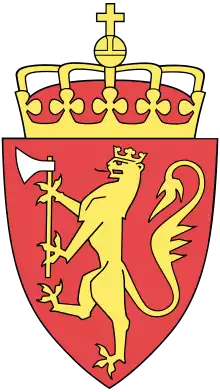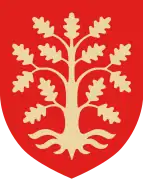Fjære
Fjære is a former municipality in the old Aust-Agder county in Norway. The 60.4-square-kilometre (23.3 sq mi) municipality existed from 1846 until 1971. It was located to the north of the town of Grimstad. The name is still used to refer to that area, which is now a part of Grimstad municipality in Agder county. The administrative centre of Fjære was the village of Vik, just east of the historic Fjære Church. Other villages in Fjære included Fevik, Dømmesmoen, Frivold, Kroken, and Rønnes.[2]
Fjære kommune | |
|---|---|
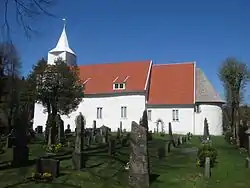 View of Fjære Church | |
 Aust-Agder within Norway | |
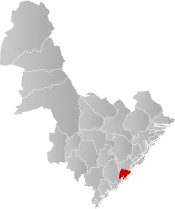 Fjære within Aust-Agder | |
| Coordinates: 58°21′58″N 08°35′40″E | |
| Country | Norway |
| County | Aust-Agder |
| District | Østre Agder |
| Established | 1 Jan 1846 |
| Disestablished | 1 Jan 1971 |
| Administrative centre | Vik |
| Area | |
| • Total | 60.4 km2 (23.3 sq mi) |
| *Area at municipal dissolution. | |
| Population (1971) | |
| • Total | 6,189 |
| • Density | 100/km2 (270/sq mi) |
| Demonym(s) | Fjæresokning[1] |
| Time zone | UTC+01:00 (CET) |
| • Summer (DST) | UTC+02:00 (CEST) |
| ISO 3166 code | NO-0923 |
| Preceded by | Øyestad in 1846 |
| Succeeded by | Grimstad in 1971 |
History
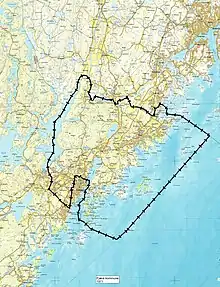
The municipality of Fjære was created in 1846 when the old municipality of Øyestad was divided. Initially, Fjære had a population of 2,806. The first municipal council met at a farmhouse at Bringsvær, north of Vik. In 1886, the council began meeting in the village of Vik.[3]
On 1 January 1878, a part of Fjære located adjacent to the town of Grimstad (population: 948) was transferred from Fjære to Grimstad. Again, on 1 January 1960, another part of Fjære located next to Grimstad (population: 344) was transferred from Fjære to the town of Grimstad.
On 1 January 1971, the neighboring municipalities of Fjære (population: 6,189) and Landvik (population: 2,781) were merged with the town of Grimstad (population: 2,794) to form a much larger municipality called Grimstad.[4]
Government
All municipalities in Norway, including Fjære, are responsible for primary education (through 10th grade), outpatient health services, senior citizen services, unemployment and other social services, zoning, economic development, and municipal roads. The municipality was governed by a municipal council of elected representatives, which in turn elected a mayor.[6]
Municipal council
The municipal council (Kommunestyre) of Fjære was made up of representatives that were elected to four year terms. The party breakdown of the final municipal council was as follows:
| Party Name (in Norwegian) | Number of representatives | |
|---|---|---|
| Labour Party (Arbeiderpartiet) | 11 | |
| Conservative Party (Høyre) | 6 | |
| Christian Democratic Party (Kristelig Folkeparti) | 4 | |
| Centre Party (Senterpartiet) | 1 | |
| Liberal Party (Venstre) | 3 | |
| Total number of members: | 25 | |
| Party Name (in Norwegian) | Number of representatives | |
|---|---|---|
| Labour Party (Arbeiderpartiet) | 10 | |
| Conservative Party (Høyre) | 7 | |
| Christian Democratic Party (Kristelig Folkeparti) | 5 | |
| Centre Party (Senterpartiet) | 1 | |
| Liberal Party (Venstre) | 2 | |
| Total number of members: | 25 | |
| Party Name (in Norwegian) | Number of representatives | |
|---|---|---|
| Labour Party (Arbeiderpartiet) | 10 | |
| Conservative Party (Høyre) | 7 | |
| Christian Democratic Party (Kristelig Folkeparti) | 5 | |
| Centre Party (Senterpartiet) | 1 | |
| Liberal Party (Venstre) | 2 | |
| Total number of members: | 25 | |
| Party Name (in Norwegian) | Number of representatives | |
|---|---|---|
| Labour Party (Arbeiderpartiet) | 9 | |
| Conservative Party (Høyre) | 7 | |
| Christian Democratic Party (Kristelig Folkeparti) | 4 | |
| Farmers' Party (Bondepartiet) | 2 | |
| Liberal Party (Venstre) | 3 | |
| Total number of members: | 25 | |
| Party Name (in Norwegian) | Number of representatives | |
|---|---|---|
| Labour Party (Arbeiderpartiet) | 8 | |
| Conservative Party (Høyre) | 7 | |
| Christian Democratic Party (Kristelig Folkeparti) | 3 | |
| Farmers' Party (Bondepartiet) | 1 | |
| Liberal Party (Venstre) | 5 | |
| Total number of members: | 24 | |
| Party Name (in Norwegian) | Number of representatives | |
|---|---|---|
| Labour Party (Arbeiderpartiet) | 7 | |
| Conservative Party (Høyre) | 7 | |
| Communist Party (Kommunistiske Parti) | 1 | |
| Christian Democratic Party (Kristelig Folkeparti) | 2 | |
| Farmers' Party (Bondepartiet) | 2 | |
| Joint list of the Liberal Party (Venstre) and the Radical People's Party (Radikale Folkepartiet) | 5 | |
| Total number of members: | 24 | |
| Party Name (in Norwegian) | Number of representatives | |
|---|---|---|
| Labour Party (Arbeiderpartiet) | 8 | |
| Conservative Party (Høyre) | 6 | |
| Communist Party (Kommunistiske Parti) | 2 | |
| Christian Democratic Party (Kristelig Folkeparti) | 2 | |
| Farmers' Party (Bondepartiet) | 2 | |
| Joint list of the Liberal Party (Venstre) and the Radical People's Party (Radikale Folkepartiet) | 4 | |
| Total number of members: | 24 | |
| Party Name (in Norwegian) | Number of representatives | |
|---|---|---|
| Labour Party (Arbeiderpartiet) | 7 | |
| Conservative Party (Høyre) | 9 | |
| Farmers' Party (Bondepartiet) | 2 | |
| Liberal Party (Venstre) | 6 | |
| Total number of members: | 24 | |
Attractions
Fjære Church
Fjære Church (Fjære kirke) is made of stone and dates back to the middle of the 12th century. Despite being 850 years old, it is an active parish church. It was not completed in one generation, but was created gradually over the centuries. The church grew together with the village and the people, and became the centre of Fjære's history from the Middle Ages until the present day. The oldest and most valuable individual cultural monuments in and around Fjære Church are the finely sculpted head of a man in stone over the south door, dating from before 1150.[15]
The church's unique and beautiful baptismal font, in the High Gothic style from the Middle Ages. Olavskilden, a fountain associated with St. Olav the Holy. The Terje Vigen stone monument in memory of the brave men of the 1807–1814 war. The stone monument was erected in 1906 by the friends of Terje Vigen. The altarpiece, pulpit with paneled ceiling and pews with the names of farms painted on them are considered valuable. They were made during the period from 1500–1700. The well-preserved church is located approximately 3 kilometres (1.9 mi) north of the town of Grimstad.[16]
References
- "Navn på steder og personer: Innbyggjarnamn" (in Norwegian). Språkrådet.
- Thorsnæs, Geir, ed. (19 July 2015). "Fjære – tidligere kommune i Aust-Agder". Store norske leksikon (in Norwegian). Kunnskapsforlaget. Retrieved 9 November 2017.
- "Grimstad rådhus" (in Norwegian). Grimstad kommune. Retrieved 9 November 2017.
- Jukvam, Dag (1999). "Historisk oversikt over endringer i kommune- og fylkesinndelingen" (PDF) (in Norwegian). Statistisk sentralbyrå.
- Rygh, Oluf (1905). Norske gaardnavne: Nedenes amt (in Norwegian) (8 ed.). Kristiania, Norge: W. C. Fabritius & sønners bogtrikkeri. p. 115.
- Hansen, Tore, ed. (12 May 2016). "kommunestyre". Store norske leksikon (in Norwegian). Kunnskapsforlaget. Retrieved 21 December 2020.
- "Kommunevalgene 1967" (PDF) (in Norwegian). Oslo: Statistisk sentralbyrå. 1967. Retrieved 21 December 2020.
- "Kommunevalgene 1963" (PDF) (in Norwegian). Oslo: Statistisk sentralbyrå. 1964. Retrieved 21 December 2020.
- "Kommunevalgene og Ordførervalgene 1959" (PDF) (in Norwegian). Oslo: Statistisk sentralbyrå. 1960. Retrieved 21 December 2020.
- "Kommunevalgene og Ordførervalgene 1955" (PDF) (in Norwegian). Oslo: Statistisk sentralbyrå. 1957. Retrieved 21 December 2020.
- "Kommunevalgene og Ordførervalgene 1951" (PDF) (in Norwegian). Oslo: Statistisk sentralbyrå. 1952. Retrieved 21 December 2020.
- "Kommunevalgene og Ordførervalgene 1947" (PDF) (in Norwegian). Oslo: Statistisk sentralbyrå. 1948. Retrieved 21 December 2020.
- "Kommunevalgene og Ordførervalgene 1945" (PDF) (in Norwegian). Oslo: Statistisk sentralbyrå. 1947. Retrieved 21 December 2020.
- "Kommunevalgene og Ordførervalgene 1937" (PDF) (in Norwegian). Oslo: Statistisk sentralbyrå. 1938. Retrieved 21 December 2020.
- "Fjære kirke". kunsthistorie. Retrieved 1 October 2016.
- "Grimstad Municipality in Norway". GoNorway.com.
